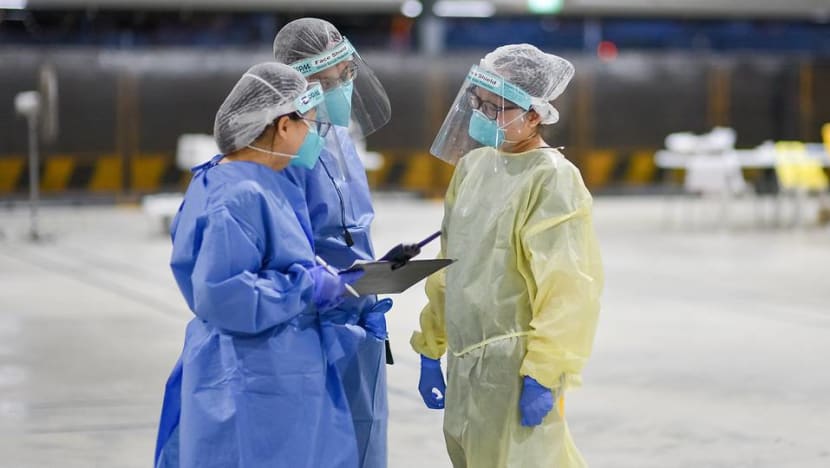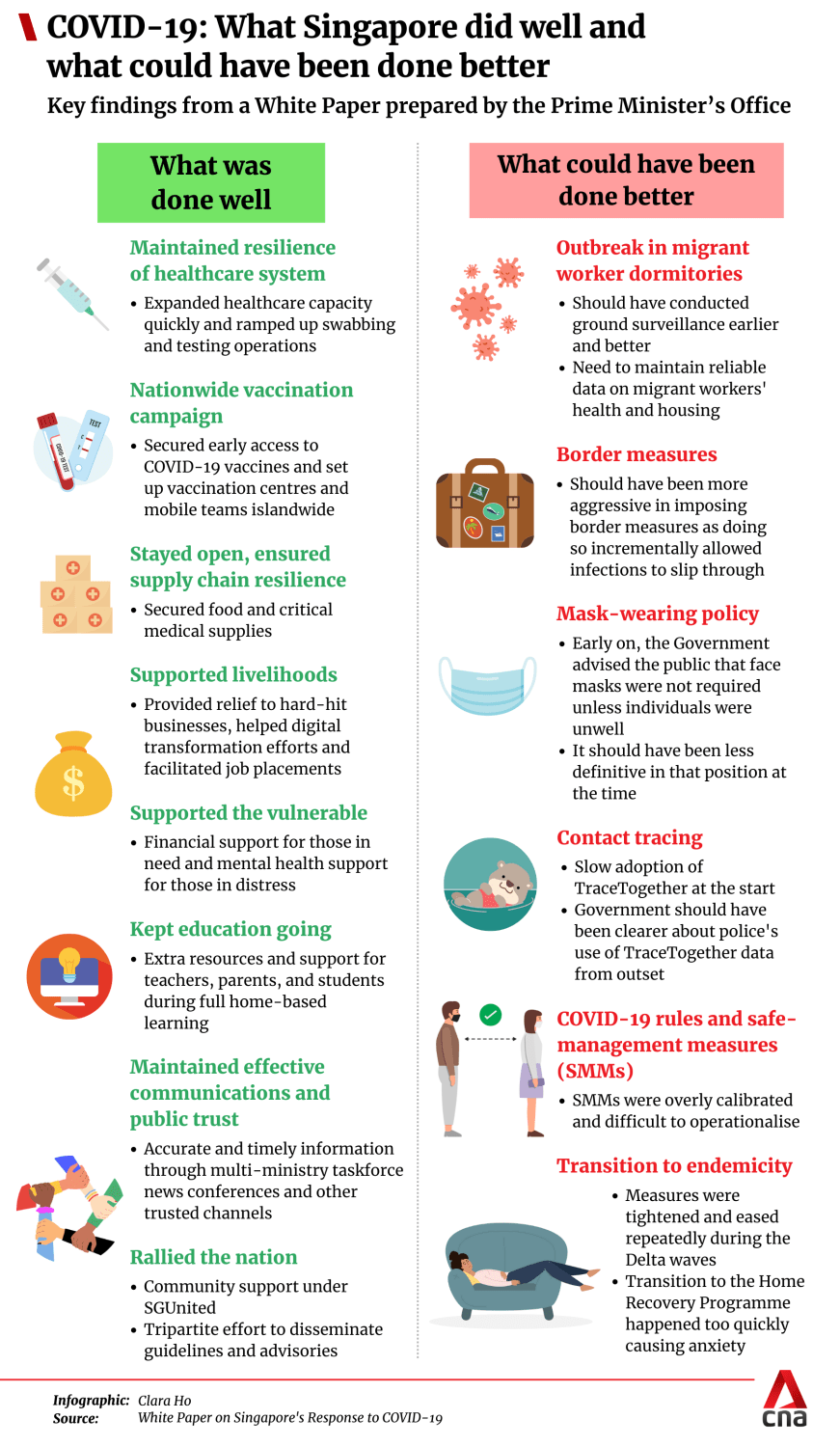Singapore’s COVID-19 vaccine strategy paid off, frontline workers ‘brightest spot’ in crisis response: White Paper
Support for workers and businesses, home-based learning and effective public communications were other areas highlighted in the government review.

Healthcare personnel are seen at a night clinic for migrant workers in Singapore. (Photo: Ministry of Manpower)
SINGAPORE: The early bets that Singapore placed on COVID-19 vaccines and the resilience of the healthcare system were among eight areas where the Government did well, according to a review of its pandemic response published on Wednesday (Mar 8).
The White Paper, published by the Prime Minister’s Office, also highlighted areas where the Government could have done better, including its U-turn on mask-wearing, confusing safe management rules and the outbreak in migrant worker dormitories that could have been a "major disaster".
At the outset, the review noted that Singapore’s overall case fatality rate was less than 0.1 per cent, compared with a global average of 1.0 per cent. Its vaccination rates are also among the highest in the world.
“Relative to other countries, we have done well in protecting both lives and livelihoods,” stated the White Paper.
The White Paper draws on a review conducted by former head of civil service Peter Ho, which included interviews with ministers and civil servants.
It also includes findings of reviews by various government agencies and perspectives from the people and private sectors.
The White Paper will be debated at the next sitting of Parliament on Mar 20. An audit of some of the Government expenditure spent fighting COVID-19 is being conducted separately by the Auditor-General’s Office.
EARLY BETS ON VACCINES
The Government recognised “very early on” that vaccines were the most promising exit strategy and worked to secure early access to the vaccines, according to the White Paper.
To gain timely access with a low volume of orders, it had to sign advance purchase agreements and make early down payments on the most promising vaccine candidates. This meant Singapore had to “place bets, at substantial cost, on potential game-changers” before trials were completed.

A planning group formed in April 2020 launched horizon scans to identify vaccines with potential. In June 2020, it took a risk on Moderna’s novel mRNA vaccine technology, followed 12 weeks later by the Pfizer-BioNTech vaccine.
“These advance purchase agreements paid off several months later when the US Food and Drug Administration approved emergency use of both these vaccines,” stated the White Paper.
“We had taken calculated risks on promising vaccine candidates across different technologies, effectively buying multiple insurance because we saw this as a worthwhile price to pay to protect Singaporeans and facilitate economic reopening. Our strategy paid off.”
The review also highlighted the national vaccination roll-out, which involved making the vaccines readily available to the population and backing them with clear and sustained communication on the benefits of vaccination.
MAINTAINING RESILIENCE OF HEALTHCARE SYSTEM
After the severe acute respiratory syndrome (SARS) outbreak in 2003, the National Public Health Laboratory (NHPL) was established in 2009 and the National Centre for Infectious Diseases (NCID) in 2019.
These institutions contributed significantly to Singapore’s COVID-19 response, the review observed. The NHPL developed a polymerase chain reaction (PCR) test early in the pandemic, while the NCID established best practices and protocols for dealing with the virus.
During the “circuit breaker” in 2020, the Health Ministry quickly ramped up different levels of healthcare facilities – from isolation rooms to community facilities – to support COVID-19 patients.
Within a year in 2020, the ministry also increased testing capacity and capability from about 100 PCR tests a day at 10 public sector hospital laboratories, to about 60,000 PCR tests a day.
Teamwork across the public, private and people sectors was what prevented the healthcare system from being overwhelmed, the review stated.
“All our healthcare workers and volunteers worked tirelessly throughout the pandemic while accepting the stress and risk of being infected and being away from their loved ones.
“The brightest spot in Singapore’s crisis response was the selfless dedication of our frontline fighters, who rose to the challenge and went the extra mile.”
ENSURING SUPPLY CHAIN RESILIENCE
The Government maintained Singapore’s connectivity to the world, which was crucial to supply chain resilience, noted the review.
It maintained a supply of essential goods by enhancing pre-emptive stockpiling and securing the availability of sea shipping when air cargo capacity became restricted.
When land links with Malaysia closed, it also ensured a continued flow of essential goods and workers across the border. Steps were also taken to diversify Singapore’s food supplies.
At the same time, the Government never imposed export controls.
In particular, when production capacity for pharmaceuticals and medical equipment was disrupted worldwide, companies in Singapore like 3M were able to continue fulfilling global demand.
SUPPORT FOR WORKERS AND BUSINESSES
Singapore’s economy contracted by 3.9 per cent in 2020 but bounced back to 8.9 per cent growth in 2021, according to revised figures, with the White Paper highlighting government support for workers and businesses.
The Jobs Support Scheme, which helped employers pay a portion of workers’ salaries, is estimated to have saved 165,000 jobs during the initial months of the pandemic and reduced the resident unemployment rate in 2020 and 2021.

Under the SGUnited Jobs and Skills Package to place job seekers in short-term and longer-term positions, about 200,000 places were taken up from April 2020 to April 2022.
The Government also introduced temporary measures to support businesses, such as rental rebates, bridging loan programmes and deferment of loan repayments. This brought relief to at least S$100 billion worth of contracts by small and medium enterprises across the economy.
The White Paper noted that Singapore’s resident unemployment rate stayed below 5 per cent throughout 2020, even when economic conditions were at their worst, and had returned to pre-COVID levels by December 2020.
HOME-BASED LEARNING, SUPPORT FOR THE VULNERABLE
Home-based learning during the pandemic helped to accelerate changes in educational technology, the review found. This included equipping secondary school students with personal digital devices, which would normally have taken years.
The White Paper traced the steps taken to ensure continuity of education throughout the pandemic, including additional resources for teachers to regularly check in with students, remaining open for students with no care arrangements, as well as supporting parents.
The pandemic also caused emotional, psychological and financial distress for many, with vulnerable individuals, including seniors, of the greatest concern.
The White Paper spotlighted the Government’s support for the vulnerable through temporary assistance schemes, social service agencies addressing increased needs on the ground, protective measures being stepped up in nursing and elderly homes, and measures to tackle mental health needs.
PUBLIC TRUST, RALLYING TOGETHER
The review found that the Government put out information in a timely fashion through trusted channels like the regular multi-ministry task force press conferences and a dedicated WhatsApp channel.
“We were upfront in outlining the uncertainties and risks we faced, and in putting out new information – even if it was bad news – to prepare the population for difficulties ahead,” stated the White Paper.
The Government also stepped up efforts to counter misinformation, scams and foreign influence operations during the pandemic. Ultimately, effective communication was critical to maintaining public trust.
“Indeed, the key to our handling of the crisis has been the trust of the people – trust that the Government is competent and will make the right decisions with the best interest of Singapore and Singaporeans at heart; trust that the Government is on the level with the population; trust that if there was a shortcoming or incorrect decision, we would acknowledge and rectify it; trust that each of us will act responsibly and do what we can to keep others safe; and trust within the community that we have one another’s backs,” the White Paper stated.
It also identified the ability of the nation to rally together across public and private sectors, among tripartite partners, in volunteer-led groups and across the public service as an area that went well during the pandemic.
“As a result of the strong partnerships that developed in this crisis, Singapore’s social capital – the intricate network of bonds linking us together – was strengthened and deepened," it added.
Editor's note: This article has been updated to reflect that the review by the Auditor-General's Office is only for some of the Government's expenditure to fight COVID-19, not the full S$72.3 billion.



















